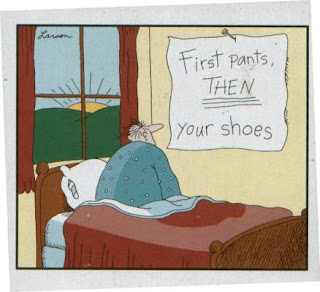Modal Verb
CAN
Can is an auxiliary verb, a modal auxiliary verb. We use
can to:
- talk about possibility and ability
- make requests
- ask for or give permission
Structure of Can
subject + can + main verb
The main verb is always the bare infinitive (infinitive without "to").
| subject | auxiliary verb | main verb | |
| + | I | can | play | tennis. |
| - | He | cannot | play | tennis. |
| can't |
| ? | Can | you | play | tennis? |
Notice that:
- Can is invariable. There is only one form of can.
- The main verb is always the bare infinitive.
The main verb is always the bare infinitive (infinitive without "to"). We cannot say:

Use of Can
can: Possibility and Ability
We use
can to talk about what is possible, what we are able or free to do:
- She can drive a car.
- John can speak Spanish.
- I cannot hear you. (I can't hear you.)
- Can you hear me?
Normally, we use
can for the present. But it is possible to use
can when we make present decisions about future ability.
- Can you help me with my homework? (present)
- Sorry. I'm busy today. But I can help you tomorrow. (future)
can: Requests and Orders
We often use
can in a question to ask somebody to do something. This is not a real question - we do not really want to know if the person is able to do something, we want them to do it! The use of
can in this way is informal (mainly between friends and family):
- Can you make a cup of coffee, please.
- Can you put the TV on.
- Can you come here a minute.
- Can you be quiet!
can: Permission
We sometimes use
can to ask or give permission for something:
- Can I smoke in this room?
- You can't smoke here, but you can smoke in the garden.
(Note that we also use could, may, might for permission. The use of
can for permission is informal.)
"Can" is one of the most commonly used modal verbs in English. It can be used to express ability or opportunity, to request or offer permission, and to show possibility or impossibility.
Examples:
- I can ride a horse.
- We can stay with my brother when we are in Paris.
- She cannot stay out after 10 PM.
- Can you hand me the stapler?
- Any child can grow up to be president.
Using "Can" in Present, Past, and Future
Most modal verbs behave quite irregularly in the past and the future. Study the chart below to learn how "can" behaves in different contexts.
| Modal Use | Positive Forms
1. = Present 2. = Past
3. = Future | Negative Forms
1. = Present 2. = Past
3. = Future | You can also use: |
can
| 1. I can speak Chinese. 2. SHIFT TO "COULD"
I could speak Chinese when I was a kid.
3. SHIFT TO "BE ABLE TO"
I will be able to speak Chinese by the time I finish my course. | 1. I can't speak Swahili. 2. SHIFT TO "COULD"
I couldn't speak Swahili.
3. SHIFT TO "BE ABLE TO"
I won't be able to speak Swahili. | be able to |
can
| 1. With a burst of adrenaline, people can pick up cars. 2. SHIFT TO "BE ABLE TO"
With a sudden burst of adrenaline, he was able to lift the car off the child's leg.
3. SHIFT TO "BE ABLE TO"
With a sudden burst of adrenaline, he will be able to lift the car. | 1. Even with a burst of adrenaline, people can't pick up something that heavy. 2. SHIFT TO "BE ABLE TO"
Even the weight lifter, couldn't lift the car off the child's leg.
3. SHIFT TO "BE ABLE TO"
Even three men working together won't be able to lift the car. | be able to |
can
| 1. I have some free time. I can help her now. 2. SHIFT TO "BE ABLE TO"
I had some free time yesterday. I was able to help her at that time.
3. I'll have some free time tomorrow. I can help her then. | 1. I don't have any time. I can't help her now. 2. SHIFT TO "BE ABLE TO"
I didn't have time yesterday. I wasn't able to help her at that time.
3. I won't have any time later. I can't help her then. | be able to |
can
| 1. I can drive Susan's car when she is out of town. 2. SHIFT TO "BE ALLOWED TO "
I was allowed to drive Susan's car while she was out of town last week.
3. I can drive Susan's car while she is out of town next week. | 1. I can't drive Susan's car when she is out of town. 2. SHIFT TO "BE ALLOWED TO "
I wasn't allowed to drive Susan's car while she was out of town last week.
3. I can't drive Susan's car while she is out of town next week. | may |
can
| Can I have a glass of water? Can you give me a lift to school?
| Can't I have a glass of water? Can't you give me a lift to school?
| could, may |
can
| Anyone can become rich and famous if they know the right people. Learning a language can be a real challenge.
| It can't cost more than a dollar or two. You can't be 45! I thought you were about 18 years old.
| could |










